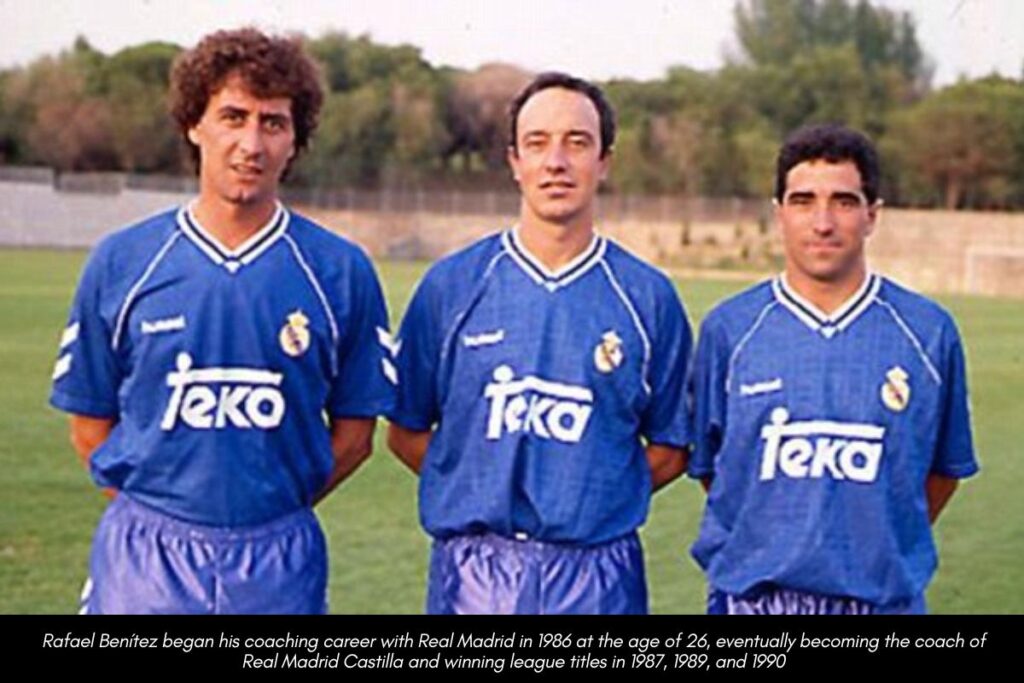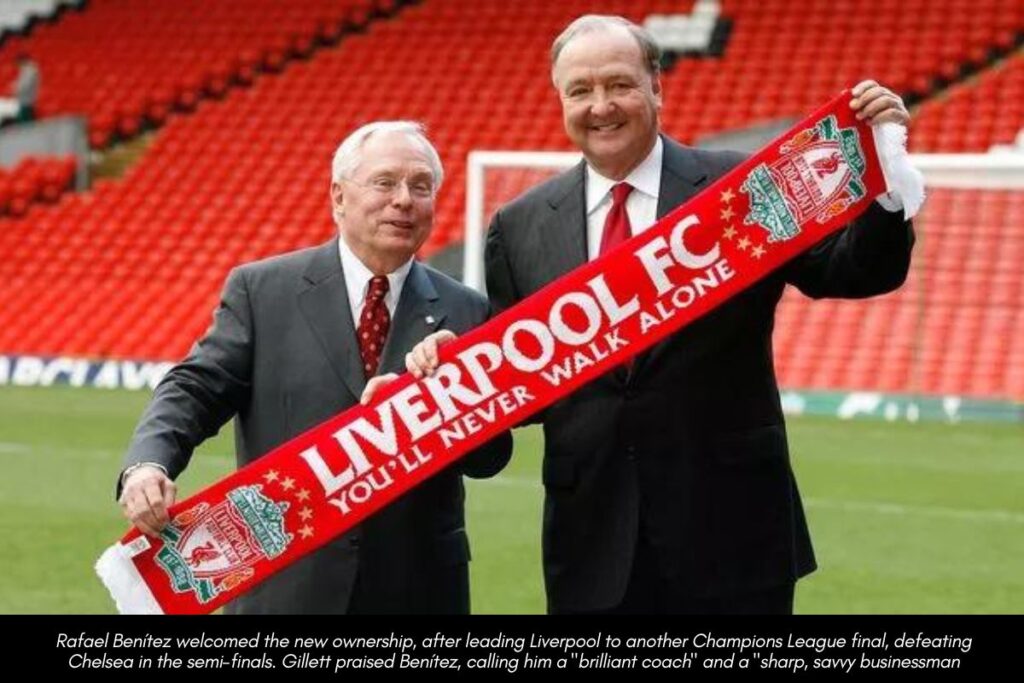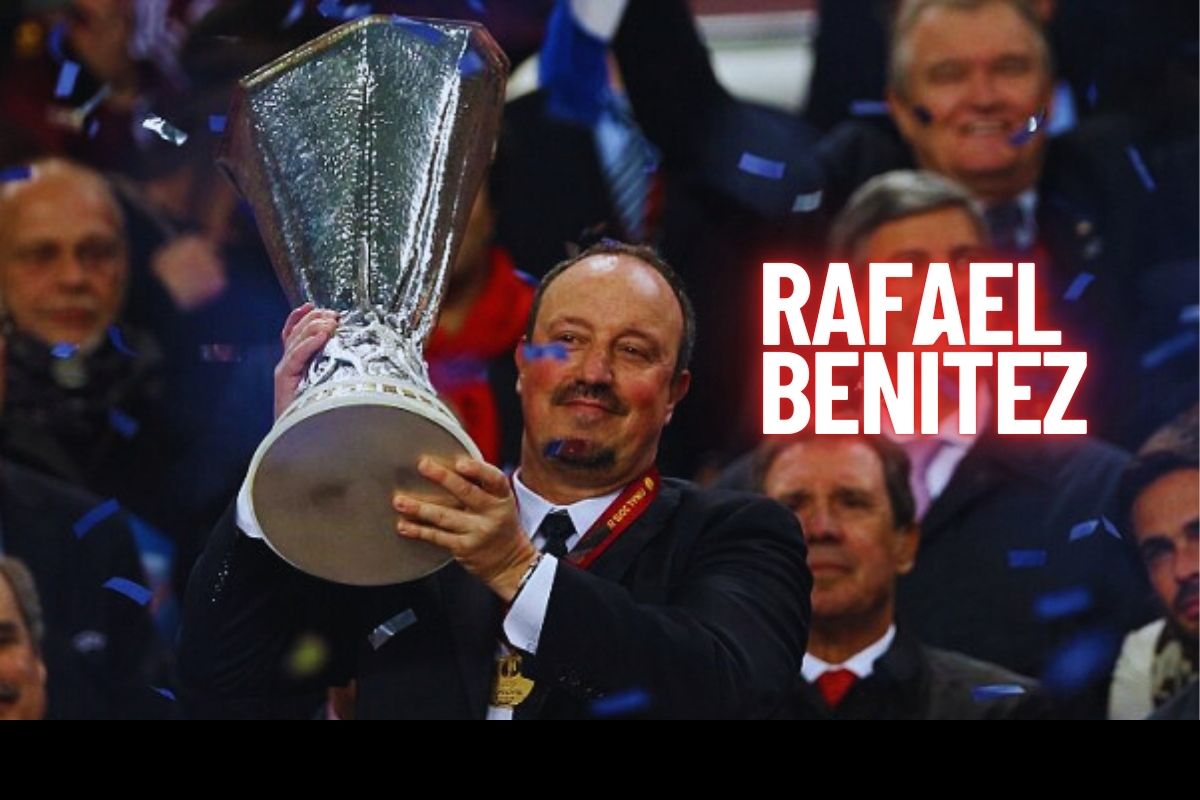Rafael Benítez’s managerial journey is a compelling tale of triumphs, challenges, and resilience in the world of football. Beginning his coaching career at Real Madrid’s youth teams, Benítez quickly made a name for himself by leading clubs like Valencia to La Liga glory and guiding Liverpool to a historic UEFA Champions League victory. His tactical acumen and ability to inspire teams were evident in his successes, but his career also saw short-lived stints at clubs like Inter Milan and Real Madrid, highlighting the volatile nature of football management.
From promotions with clubs like Extremadura and Tenerife to navigating the pressures of managing giants such as Chelsea, Napoli, and Newcastle United, Benítez’s story is one of continuous adaptation and pursuit of excellence. This narrative will explore his early career, his transformative impact at various clubs, and his enduring legacy in football management.
Early Life and Career
Delving into his outstanding profile, Rafael Benítez Maudes was born on April 16, 1960, in Madrid, Spain. As a midfielder, he played for Real Madrid Aficionados in the Tercera División and Real Madrid Castilla in the Segunda División, showcasing his early promise in football.
While also pursuing a degree in physical education from INEF at the Universidad Politécnica de Madrid, he represented Spain in the 1979 World Student Games in Mexico City. Benítez’s career took a hit when an injury during a match against Canada sidelined him for a year, significantly impacting his potential as a player. Despite this setback, Rafael Benítez continued his career with Tercera División side Parla, helping them achieve promotion to Segunda División B. Later, he joined Segunda División B club Linares, where he also took on player-coach responsibilities. Persistent injury problems during the 1985-86 season eventually led to his retirement as a player.
Managerial Career Before Liverpool FC
Rafael Benítez began his coaching career with Real Madrid in 1986 at the age of 26, eventually becoming the coach of Real Madrid Castilla and winning league titles in 1987, 1989, and 1990. He also led the U-19 team to multiple cup victories. Despite his success in the youth system, his first senior management roles were less fruitful. Benítez managed Real Valladolid and Osasuna with little success but found stability with Extremadura, leading them to promotion to La Liga in 1997. After a brief stint with Tenerife, Benítez joined Valencia in 2001, where he transformed the team into champions.

Under his leadership, Valencia won La Liga in the 2001-02 season, their first title in 31 years. Although the following season was disappointing, Benítez’s side rebounded to win La Liga again in 2003-04 and also secured the UEFA Cup. However, disagreements with the club’s director of football over player signings led to Benítez’s resignation. Seeking more control over squad decisions, Rafael Benítez left Valencia and joined Liverpool in 2004, aiming to bring his tactical prowess and success to the Premier League. His tenure at Valencia, marked by both domestic and European triumphs, set the stage for his celebrated career in England.
His Career at Anfield Stadium
Rafael Benítez took over as Liverpool manager from Gérard Houllier on 16 June 2004, becoming the first Spaniard to manage in the Premier League. One of his immediate challenges was to convince captain Steven Gerrard to stay, successfully retaining him but losing Michael Owen to Real Madrid. Benítez brought in key signings like Luis García and Xabi Alonso, who quickly became fan favorites.
Despite injuries to key players, Benítez’s first season saw Liverpool finish fifth in the Premier League and lose the League Cup final to Chelsea. However, the club’s Champions League campaign was a different story. They overcame a tough group stage and, with bold team selections, defeated Bayer Leverkusen, Juventus, and Chelsea to reach the final against AC Milan. In the Miracle of Istanbul, Liverpool came back from 3-0 down at halftime to win on penalties, securing their fifth European Cup.
Rafael Benítez’s tactical acumen and calm approach were credited with this success. He became the second Liverpool manager to win the Champions League in his first season. However, Benítez faced challenges, including replacing key players. Pepe Reina replaced Jerzy Dudek as first-choice keeper, and several new signings, like Peter Crouch and Mohamed Sissoko, were brought in to strengthen the squad.
In his second season, Benítez led Liverpool to third place in the Premier League and an FA Cup victory. The FA Cup final against West Ham mirrored the Champions League final, with Liverpool coming from behind to win on penalties after a dramatic 3-3 draw, highlighted by a late equalizer from Gerrard. Despite these successes, Rafael Benítez constantly faced challenges, including balancing domestic and European competitions and managing player transfers to maintain Liverpool’s competitive edge.
Misunderstanding with New Owners, Gillet and Tom Hicks
In 2006, ‘new owners‘ George Gillett and Tom Hicks took over Liverpool, bringing high hopes for increased funding and a new stadium. Initially, Rafael Benítez welcomed the new ownership, especially after leading Liverpool to another Champions League final, defeating Chelsea in the semi-finals. Gillett praised Benítez, calling him a “brilliant coach” and a “sharp, savvy businessman.” However, tensions soon emerged as Benítez demanded more support in the transfer market, feeling that the owners were not fully backing his vision. This was exacerbated by Liverpool’s initial lack of activity in the transfer window.

Despite these issues, Benítez managed to make significant signings, including breaking Liverpool’s transfer record for Spanish striker Fernando Torres. Other notable signings included Ryan Babel, Yossi Benayoun, Lucas Leiva, and Andriy Voronin. However, the relationship between Benítez and the owners deteriorated further due to disagreements over future transfers and a public falling-out, which played out in the media.
Liverpool’s domestic campaign faltered during the winter months, leading to a shock FA Cup exit at home to Barnsley and a loss to Chelsea in the Champions League semi-finals. Despite these setbacks, Benítez remained committed to Liverpool, but the power struggle with the board and the uncertainty over his future cast a shadow over his tenure. The situation worsened when it was revealed that Jürgen Klinsmann had been offered Benítez’s job, further straining relations with the American owners. Rafael Benítez’s inability to secure trophies during this period highlighted the challenges he faced under the new leadership.
Management Style a Problem?
Rafael Benítez’s preferred formation was a 4–2–3–1, a setup he used effectively at both Valencia and Liverpool. Known for his tactical acumen, particularly in European ties, Benítez was adept at exploiting opposition weaknesses. His calm demeanor and strategic adjustments, such as during the 2005 UEFA Champions League Final, were credited with inspiring dramatic comebacks.
Despite his successes, Benítez often faced criticism, especially for his commitment to squad rotation and zonal marking. Critics argued these tactics led to defensive lapses and inconsistent performances, though Benítez maintained they were essential for maintaining player fitness and team performance over long seasons. His approach saw mixed responses; while he led Liverpool to Champions League and FA Cup victories, his methods also drew scrutiny from pundits and fans. Rafael Benítez’s management style included a focus on youth development, exemplified by appointing club legend Kenny Dalglish to a senior role at the academy, emphasizing long-term club growth.
Conclusion
Rafael Benítez’s managerial career is marked by tactical brilliance, resilience, and a commitment to youth development. His innovative use of formations and his calm, methodical approach to high-pressure situations earned him notable successes, including a memorable Champions League victory with Liverpool. Despite facing criticism for his rotational policies and zonal marking, Benítez’s results often vindicated his strategies. His tenure at various clubs highlights a journey of significant achievements tempered by challenges, including confrontations with club management and navigating underperforming squads. Ultimately, Benítez’s legacy is that of a dedicated and astute manager who left an indelible mark on the football world through his strategic ingenuity and unwavering determination.
Read all other posts on Rafael Benítez
Find the Latest News on Player Ratings | Transfers | Prematch | Postmatch
Stay tuned for more updates on Liverpool FC Times and Stories. Your thoughts are always welcome in the comments section. Thank you for your continued support!
YNWA (You’ll Never Walk Alone)!
The Liverpool FC Times Team
LiverpoolFCTimes.com
